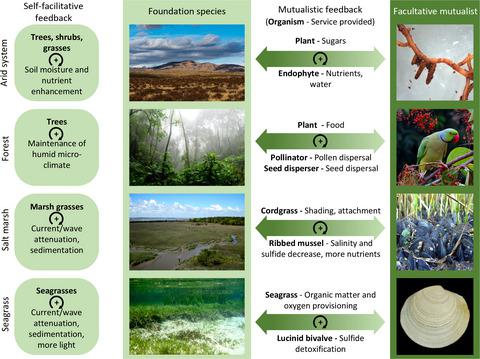当前位置:
X-MOL 学术
›
Ecol. Evol.
›
论文详情
Our official English website, www.x-mol.net, welcomes your feedback! (Note: you will need to create a separate account there.)
Facultative mutualisms: A double‐edged sword for foundation species in the face of anthropogenic global change
Ecology and Evolution ( IF 2.6 ) Pub Date : 2020-12-04 , DOI: 10.1002/ece3.7044 Tjisse Heide 1, 2 , Christine Angelini 3 , Jimmy Fouw 4 , Johan S. Eklöf 5
Ecology and Evolution ( IF 2.6 ) Pub Date : 2020-12-04 , DOI: 10.1002/ece3.7044 Tjisse Heide 1, 2 , Christine Angelini 3 , Jimmy Fouw 4 , Johan S. Eklöf 5
Affiliation

|
Ecosystems worldwide depend on habitat‐forming foundation species that often facilitate themselves with increasing density and patch size, while also engaging in facultative mutualisms. Anthropogenic global change (e.g., climate change, eutrophication, overharvest, land‐use change), however, is causing rapid declines of foundation species‐structured ecosystems, often typified by sudden collapse. Although disruption of obligate mutualisms involving foundation species is known to precipitate collapse (e.g., coral bleaching), how facultative mutualisms (i.e., context‐dependent, nonbinding reciprocal interactions) affect ecosystem resilience is uncertain. Here, we synthesize recent advancements and combine these with model analyses supported by real‐world examples, to propose that facultative mutualisms may pose a double‐edged sword for foundation species. We suggest that by amplifying self‐facilitative feedbacks by foundation species, facultative mutualisms can increase foundation species’ resistance to stress from anthropogenic impact. Simultaneously, however, mutualism dependency can generate or exacerbate bistability, implying a potential for sudden collapse when the mutualism's buffering capacity is exceeded, while recovery requires conditions to improve beyond the initial collapse point (hysteresis). Thus, our work emphasizes the importance of acknowledging facultative mutualisms for conservation and restoration of foundation species‐structured ecosystems, but highlights the potential risk of relying on mutualisms in the face of global change. We argue that significant caveats remain regarding the determination of these feedbacks, and suggest empirical manipulation across stress gradients as a way forward to identify related nonlinear responses.
中文翻译:

兼职共生:面对人为全球变化,基础物种的双刃剑
世界各地的生态系统都依赖于能够形成栖息地的基础物种,这些物种通常通过增加密度和斑块面积来促进自身发展,同时也参与兼职共生。然而,人为的全球变化(例如,气候变化,富营养化,过度收获,土地利用变化)导致基础物种结构的生态系统迅速下降,通常以突然崩溃为特征。虽然已知破坏涉及基础物种的专性共生会导致崩溃(例如,珊瑚褪色),但兼职共生(即,与环境有关的,非约束性的互作)如何影响生态系统的复原力尚不确定。在这里,我们综合了最新的进展,并将其与实际示例支持的模型分析相结合,提出兼职共生可能为基础物种带来一把双刃剑。我们建议,通过扩大基础物种的自我促进反馈,兼职共生可以增加基础物种对人为影响的压力的抵抗力。但是,与此同时,相互依存关系可能会产生或加剧双稳态,这意味着当超出相互依存关系的缓冲能力时,可能会突然崩溃,而恢复则需要改善条件以超出初始崩溃点(滞后)。因此,我们的工作强调承认兼职共生对于保护和恢复基础物种结构的生态系统的重要性,但强调在面对全球变化时依赖共生的潜在风险。
更新日期:2021-01-08
中文翻译:

兼职共生:面对人为全球变化,基础物种的双刃剑
世界各地的生态系统都依赖于能够形成栖息地的基础物种,这些物种通常通过增加密度和斑块面积来促进自身发展,同时也参与兼职共生。然而,人为的全球变化(例如,气候变化,富营养化,过度收获,土地利用变化)导致基础物种结构的生态系统迅速下降,通常以突然崩溃为特征。虽然已知破坏涉及基础物种的专性共生会导致崩溃(例如,珊瑚褪色),但兼职共生(即,与环境有关的,非约束性的互作)如何影响生态系统的复原力尚不确定。在这里,我们综合了最新的进展,并将其与实际示例支持的模型分析相结合,提出兼职共生可能为基础物种带来一把双刃剑。我们建议,通过扩大基础物种的自我促进反馈,兼职共生可以增加基础物种对人为影响的压力的抵抗力。但是,与此同时,相互依存关系可能会产生或加剧双稳态,这意味着当超出相互依存关系的缓冲能力时,可能会突然崩溃,而恢复则需要改善条件以超出初始崩溃点(滞后)。因此,我们的工作强调承认兼职共生对于保护和恢复基础物种结构的生态系统的重要性,但强调在面对全球变化时依赖共生的潜在风险。



























 京公网安备 11010802027423号
京公网安备 11010802027423号